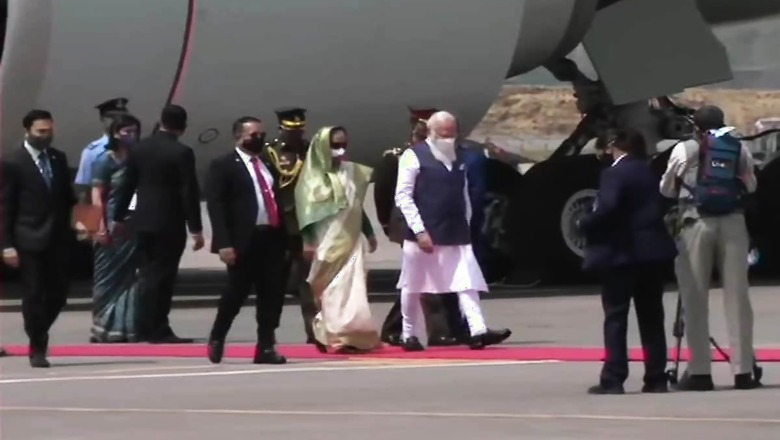
views
A visit to a famous temple dedicated to goddess Kali and an interaction with the Matua community are part of Prime Minister Narendra Modi’s two-day trip to Bangladesh, where he will participate in events celebrating 50 years of that country’s Independence.
He will hold discussions with Bangladesh Prime Minister Sheikh Hasina during the visit aimed at “furthering cooperation with our friendly neighbour”, and attend programmes commemorating Sheikh Mujibur Rahman, the country’s first President who was the face of Bangladesh’s liberation war against Pakistan.
“I also look forward to offering prayers to Goddess Kali at the ancient Jashoreshwari Kali Temple, one of the 51 Shaktipeeths in the Puranic tradition.
“I am particularly looking forward to my interaction with representatives of the Matua community at Orakandi, from where Sri Sri Harichandra Thakur ji disseminated his pious message,” Modi said in a departure statement on Thursday, a day ahead of his visit.
While the Jashoreshwari temple in Satkhira district is considered by devotees one of the 51 places made auspicious by goddess Sati’s body parts that fell there after her death, Orakandi in Faridkot district is an important site for the Matua Mahasangha — a Hindu Dalit sect.
Modi’s visit to the Kali temple will be the first-of-its-kind by a head of state. In Orakandi, where Matuas formed their original headquarters, he will interact with the family of Matua community founder Harichand Thakur, who was born there in 1812, according to media reports.
Modi’s trip to Bangladesh, and especially to these two sites, assume significance in the backdrop of the eight-phase assembly elections beginning Saturday in neighbouring West Bengal, which has cultural and linguistic similarities with the South Asian neighbour.
“I am happy that my first foreign visit after the onset of the COVID-19 pandemic will be to our friendly neighbouring country, with which India shares deep cultural, linguistic and people-to-people ties,” Modi’s departure statement said.
Political observers say Modi’s Bharatiya Janata Party (BJP) has focused on consolidating the Hindu vote to oust the ruling Trinamool Congress in Bengal, while mobilising all sections of the community from upper castes to backward sections.
Matuas, who are a part of the namasudra community, have a significant presence in Bengal’s North 24-Parganas and Nadia districts. According to analysts, they can impact the outcome in 32-33 of the total 50 assembly seats (17 in Nadia and in 33 in North 24-Parganas) there.
The support of Matuas is considered a factor behind the BJP’s impressive showing in the 2019 national elections in Bengal, where it eventually won 18 of the 42 Lok Sabha seats.
Hindu refugees from Bangladesh, a large section of the Matuas has backed the BJP-led government at the Centre over the Citizenship Amendment Act (CAA,) which fast-tracks citizenship of Hindus, Sikhs, Jains, Buddhists, Christians and Parsis who have arrived in India from Pakistan, Afghanistan and Bangladesh before 2015. The BJP has promised to implement the controversial law, opposed by chief minister Mamata Banerjee, immediately after coming to power in Bengal.
“The importance of Modi’s Orakandi visit lies in the fact that the BJP is yet to deliver on its promise of implementing the CAA. (Union home minister) Amit Shah has cited the situation triggered by Covid-19 as one of the reasons behind the delay, but a section of the Matua namasudras of West Bengal is impatient because the rules (for implementing the law) have not been framed…this has left people in the dark on the modalities of getting citizenship through this act,” said journalist Snigdhendu Bhattacharya, the author of Mission Bengal: A Saffron Experiment.
“Therefore, by visiting the original headquarters of the Matua sect in Orakandi, Modi wants to send out a message that he has the Matuas in his mind.”
Read all the Latest News, Breaking News and Coronavirus News here













Comments
0 comment